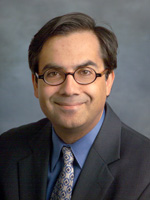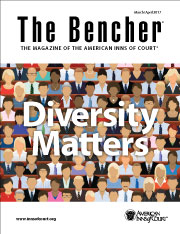Confidentiality and Withdrawal for Non-Payment of Fees
The Bencher—March/April 2017
By John P. Ratnaswamy, Esquire

 I serve as an adjunct professor in a legal ethics class taught through the “learn by doing” (simulation) method. One of the difficult situations the students face is being presented unexpectedly with a scenario in which the lawyer arguably needs to seek leave from a court to withdraw as counsel because of client misconduct. The lawyer, in seeking to withdraw, also must think about their obligation of confidentiality to the client, their duty of candor to the court, what information the court needs, and thus to what extent the lawyer may disclose confidential information in support of withdrawal.
I serve as an adjunct professor in a legal ethics class taught through the “learn by doing” (simulation) method. One of the difficult situations the students face is being presented unexpectedly with a scenario in which the lawyer arguably needs to seek leave from a court to withdraw as counsel because of client misconduct. The lawyer, in seeking to withdraw, also must think about their obligation of confidentiality to the client, their duty of candor to the court, what information the court needs, and thus to what extent the lawyer may disclose confidential information in support of withdrawal.
Another possible withdrawal scenario is when a client fails to pay fees owed to the lawyer. When I was a law student, ages ago, an older lawyer told me that, while he had never done it, it was not unknown for practitioners, whose clients had not paid their fees, to advise the judge that they were not ready to proceed, and were seeking leave to withdraw, because “Mr. Green” had not arrived.
I do not know if the “Mr. Green” stories are apocryphal. Either way, they seem implicitly to reflect the problem of a lawyer wishing to withdraw but also seeking to limit the revelation of information about the representation.
In December 2016, the American Bar Association’s Standing Committee on Ethics and Professional Responsibility issued its Formal Opinion 476, entitled “Confidentiality Issues when Moving to Withdraw for Nonpayment of Fees in Civil Litigation”. The opinion is based on the ABA’s Model Rules of Professional Conduct. The opinion assumes a jurisdiction that does not have specific rules about what must or may be disclosed in this situation. The opinion is limited to civil cases. The opinion is limited to withdrawal on this basis. The opinion should not be understood as addressing other withdrawal scenarios.
The opinion frames the subject as one on which there should be cooperation between lawyers and judges, in order to reach an outcome that is fair to both lawyers and clients.
The opinion assumes the lawyer is at a point that they properly can invoke Model Rule 1.16(b)(5) (permissive withdrawal when “the client substantially fails to fulfill an obligation to the lawyer regarding the lawyer’s services and has been given reasonable warning that the lawyer will withdraw unless the obligation is fulfilled”) or 1.16(b)(6) (permissive withdrawal when “the representation will result in an unreasonable financial burden on the lawyer or has been rendered unreasonably difficult by the client”).
The opinion lays out a three step process:
Thus, in order to comply with Rule 1.6, a lawyer who has a good faith basis for withdrawal under Rule 1.16(b)(5) and/or 1.16(b)(6), and who complies with the applicable procedural prerequisites of the court for such motions, could: (1) initially submit a motion providing no confidential client information apart from a reference to “professional considerations” or the like; (2) upon being informed by the court that further information is necessary, respond, when practicable, by seeking to persuade the court to rule on the motion without requiring the disclosure of confidential client information, asserting all non-frivolous claims of confidentiality and privilege; and if that fails; (3) thereupon under Rule 1.6(b)(5) submit only such information as is reasonably necessary to satisfy the needs of the court and preferably by whatever restricted means of submission, such as in camera review under seal, or such other procedures designated to minimize disclosure as the court determines is appropriate. If the court expressly orders the lawyer to make further disclosure, the exception in Rule 1.6(b)(6) for disclosures required to comply with a court order will apply, subject to the lawyer’s compliance with the requirements of Comment [15].
So, under the Model Rules, no “Mr. Green”.
John P. Ratnaswamy, Esquire, is a partner in the Chicago law firm of Rooney Rippie & Ratnaswamy LLP. He also serves as an Adjunct Professor of Legal Ethics at the Northwestern University School of Law. He is a former member of the American Bar Association’s Standing Committee on Ethics and Professional Responsibility and the Hearing Board of the Illinois Attorney Registration & Disciplinary Commission. This column should not be understood to represent the views of any of those entities or John’s or the firm’s current or former clients.
© 2017 JOHN P. RATNASWAMY, ESQ. This article was originally published in the March/April 2017 issue of The Bencher, a bi-monthly publication of the American Inns of Court. This article, in full or in part, may not be copied, reprinted, distributed, or stored electronically in any form without the express written consent of the American Inns of Court.